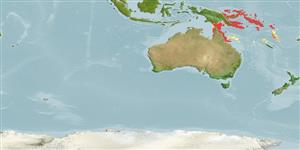分类 / Names
俗名 | 同种异名 | Catalog of Fishes(属, 种) | ITIS | CoL | WoRMS | Cloffa
Teleostei >
Ovalentaria/misc (Various families in series Ovalentaria)
鱸形目 (Various families in series Ovalentaria) >
Pomacentridae (Damselfishes)
雀鯛科(Damselfishes) (Damselfishes) > Pomacentrinae
Etymology: Amphiprion: Greek, amphi = on both sides + Greek, prion, -onos = saw (Ref. 45335).
More on author: Lacepède.
Environment: milieu / climate zone / depth range / distribution range
生态学
海洋 礁区鱼类; 非迁移的; 深度上下限 1 - 15 m (Ref. 9710). 熱帶; 6°S - 26°S, 141°E - 155°E (Ref. 55268)
Western Pacific: Queensland and Melanesia including northern Great Barrier Reef, northern New Guinea, New Britain, Solomon Islands and Vanuatu. Not known from New Caledonia and the Fiji Islands, although Fowler (1959) recorded it from the latter area. Often confused with Amphiprion ocellaris.
西太平洋: 昆士蘭省與美拉尼西亞包括大堡礁北方,新幾內亞北部,新不列顛,索羅門群島與萬那度。 已知不來自新加勒多尼亞與斐濟島,雖然 Fowler(1959) 記錄了它從較後者的區域。 時常與 Amphiprion ocellaris 互相混淆。
Length at first maturity / 大小 / 重量 / 年龄
Maturity: Lm ?, range 5 - ? cm
Max length : 11.0 cm TL 雄鱼/尚未辨别雌雄; (Ref. 9710)
背棘 (总数) : 9 - 10; 背的软条 (总数) : 14 - 17; 臀棘: 2; 臀鳍软条: 11 - 13.
全体橘色的有三条黑色-毗邻了垂直的白色条纹。 鳍也橘色的有黑边。 9根棘的背部计数.(参考文献 48636)
Adults inhabit lagoon and seaward reefs (Ref. 9710). Each group of fish consists of a breeding pair and 0-4 non-breeders. Within each group there is a size-based hierarchy: the female is largest, the male is second largest, and the non-breeders get progressively smaller as the hierarchy is descended. If the female dies, the male changes sex and becomes the breeding female, while the largest non-breeder becomes the breeding male. The maintenance of size differences may avoid conflicts, because subordinates do not become a threat to their dominants (Ref. 47841). Oviparous, distinct pairing during breeding (Ref. 205). Eggs are demersal and adhere to the substrate (Ref. 205). Males guard and aerate the eggs (Ref. 205). Maybe found in shallower depths than A. ocellaris. Associated with the anemones: Heteractis crispa, Heteractis magnifica, and Stichodactyla gigantea (Ref. 5911). This species has been reared in captivity (Ref. 35404, 35413, 35420).
栖息于泻湖与临海礁石。 (参考文献 9710) 鱼的每个群由一个繁殖对与 0-4个非养育者组成。 在每个群里面有一个以大小为基础的阶级组织: 母鱼大, 雄鱼是第二的大, 而且当阶级组织是 desceded 的时候,非养育者渐进比较小。 如果母鱼死亡, 雄鱼改变性别而且成为繁殖母鱼, 然而大的非养育者变成繁殖期的雄鱼。 因为属下不变成的威胁,所以大小不同的维护可能避开冲突他们的优势.(参考文献 47841) 似乎超过 A. ocellaris 出现在深度较浅的地方。 这种已经被后面在繁殖场。 (参考文献 35404,35413,35420) 伴随着卷曲异辐海葵了: 四色海葵 ,Heteractis magnifica, 与 Stichodactyla gigantea.(参考文献 5911)
Life cycle and mating behavior
Maturities | 繁殖 | Spawnings | Egg(s) | Fecundities | 仔鱼
Each group of fish consists of a breeding pair and 0-4 non-breeders. Within each group there is a size-based hierarchy: the female is largest, the male is second largest, and the non-breeders get progressively smaller as the hierarchy is desceded. If the female dies, the male changes sex and becomes the breeding female, while the largest non-breeder becomes the breeding male (Ref. 47841). Oviparous, distinct pairing during breeding (Ref. 205). Eggs are demersal and adhere to the substrate (Ref. 205). Males guard and aerate the eggs (Ref. 205). Also Ref. 7471.西太平洋: 昆士蘭省與美拉尼西亞包括大堡礁北方,新幾內亞北部,新不列顛,索羅門群島與萬那度。 已知不來自新加勒多尼亞與斐濟島,雖然 Fowler(1959) 記錄了它從較後者的區域。 時常與 Amphiprion ocellaris 互相混淆。
Allen, G.R., 1991. Damselfishes of the world. Mergus Publishers, Melle, Germany. 271 p. (Ref. 7247)
人类利用
渔业: 没有兴趣; 水族馆: 商业性
工具
特别资料
下载 XML
网络资源
Estimates based on models
Preferred temperature (Ref.
123201): 25.5 - 28.4, mean 27.3 °C (based on 198 cells).
Phylogenetic diversity index (Ref.
82804): PD
50 = 0.5000 [Uniqueness, from 0.5 = low to 2.0 = high].
Bayesian length-weight: a=0.01479 (0.00642 - 0.03409), b=3.00 (2.80 - 3.20), in cm total length, based on LWR estimates for this (Sub)family-body shape (Ref.
93245).
营养阶层 (Ref.
69278): 2.7 ±0.3 se; based on size and trophs of closest relatives
回复力 (Ref.
120179): 高度, 族群倍增时间少于 15个月 (Preliminary K or Fecundity.).
Fishing Vulnerability (Ref.
59153): Low vulnerability (10 of 100).
Nutrients (Ref.
124155): Calcium = 123 [67, 201] mg/100g; Iron = 0.844 [0.521, 1.333] mg/100g; Protein = 18.5 [17.4, 19.5] %; Omega3 = 0.134 [0.083, 0.212] g/100g; Selenium = 20.7 [12.1, 37.7] μg/100g; VitaminA = 126 [41, 390] μg/100g; Zinc = 2.28 [1.58, 3.16] mg/100g (wet weight);
